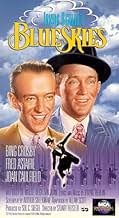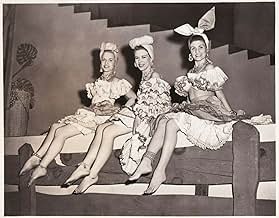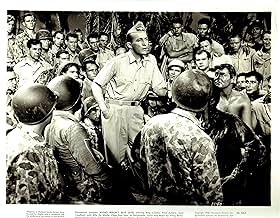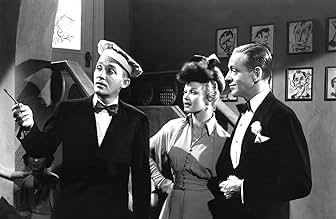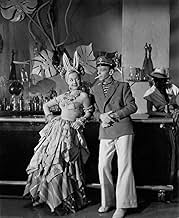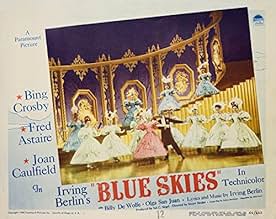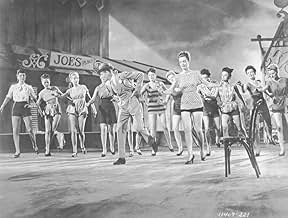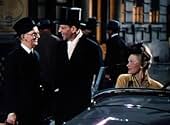Ajouter une intrigue dans votre langueAn ex-dancer and New York radio star narrates his love story for a band singer who loved a self-centered man who was unable to commit to his nightclub business or his family.An ex-dancer and New York radio star narrates his love story for a band singer who loved a self-centered man who was unable to commit to his nightclub business or his family.An ex-dancer and New York radio star narrates his love story for a band singer who loved a self-centered man who was unable to commit to his nightclub business or his family.
- Réalisation
- Scénario
- Casting principal
- Nommé pour 2 Oscars
- 3 victoires et 3 nominations au total
- Dancer
- (non crédité)
- Dolly
- (non crédité)
- Dancer
- (non crédité)
- Flapper
- (non crédité)
- Dancer
- (non crédité)
- Restaurant Patron
- (non crédité)
- Dancer
- (non crédité)
- Dancer
- (non crédité)
- Showgirl
- (non crédité)
Avis à la une
Astaire has three of his four dance numbers in the first half of the movie. One of them, "Puttin' On The Ritz," is one of the most impressive performances, if not THE best, he's ever done. It is absolutely spectacular. The movie is worth seeing for that performance alone. For the next hour, there is a romance gone sour and Crosby's crooning (some good songs, some bad).
The film's intent was to pay tribute to Irving Berlin and all the music he gave us, and it succeeds on that level. There are nothing but nice people in the movie and tons of music.....but the whole thing lacks something.
Bing and Fred play the same type roles in this as in Holiday Inn. Fred's the ambitious partner of an act who wants to get to the top of the show business ladder. Bing just wants to work at the trade and go through life with the least responsibility possible. Of course they fall for the same girl as in Holiday Inn and at Paramount in the 1940s who do you think winds up with the girl?
But the real star of this film is the music of Irving Berlin. This time Paramount gave Crosby and Astaire technicolor and it's put to good use with some great numbers. Astaire does two classic dance numbers with Putting on the Ritz and Heat Wave. Crosby gets two big budget numbers with Everybody Step and C-U-B-A, the latter nicely paired with Olga San Juan.
Previous reviewers found Joan Caulfield as the object of affections performance weak. Maybe so, but she's following a trend of Crosby leading ladies who are nice girls swept up by the Crosby song and charm. It wasn't until Jane Wyman did those two films with Bing that he got a leading lady with real spirit. Sometimes Bing didn't even get the girl.
The hit song here was You Keep Coming Back Like A Song which was a recurring theme. It got Oscar nominated, but lost to Judy Garland's train excursion On the Atchison, Topeka, and the Santa Fe.
Billy DeWolfe also does a nice comic turn and we get his famous Mrs. Mergitroid act which he did in nightclubs.
Though the plot is thin who cares when you can see Bing Crosby and Fred Astaire at their very best.
The story of this love triangle is backed up by one Irving Berlin song after another - there is a lot of music, some fine singing by Crosby and tremendous dancing by Astaire. This was to be his last film but his retirement only lasted a couple of years. He worked in film until 1977 and continued working in television and doing voiceovers until 1981; he died in 1987. In the late '50s, he did two dance specials on television, and he did one in 1968. Was he dancing at the age of 69? Probably.
The movie doesn't really hang together. The production values are great, but the story is trite, and there aren't enough fabulous numbers. Astaire does "Puttin' on the Ritz," which is the height of the film, also "Heat Wave," and with Crosby, "A Couple of Song and Dance Men." There is a section during World War II where Crosby sings some of his Berlin standards, "This is the Army, Mr. Jones," "White Christmas," and "Any Bonds Today?" The beautiful "Always" is done as a chorus number, as is "How Deep is the Ocean," with Crosby sometimes singing along.
Having heard Crosby when he had something to prove back in the early '30s, I can never be content with his crooning, except perhaps in some parts of "Holiday Inn." Astaire is the one who makes this film worthwhile at all. See it for him and for some of the music and musical numbers. Ignore the story.
It seems that the three are Vaudeville friends. Fred is head-over-heels for Joan--and Joan is in love with Bing (who is reasonably indifferent for a while). Eventually, Bing and Joan marry--and you see VERY little of Fred through much of the rest of the film. It's a shame, as I really watched this movie for him more than anything else. Eventually, the new marriage goes on the rocks because Bing is too focused on success--much to the detriment of family life. Can these folks somehow make a go of it? Now considering it's a Hollywood film, I'd say the chances are pretty great they will--though if these were real people, you'd advise to Joan to get a divorce and be done with the louse! And what about poor Fred?! What will happen with this really swell guy? Well, what REALLY happens took me aback--as it appears as if she got BOTH of them by the end of the movie! "Blue Skies" is a film weighted very heavily towards singing and Crosby's talents. So, if you love his singing, the film will no doubt be more enjoyable--especially when he sings an abbreviated version of "White Christmas" (who could dislike that?!). However, I do think the film has one or two too many musical numbers and could have used from a bit more plot. As for me, seeing Fred get to play the #3 man and only dance a bit was sad--though his number "Putting on the Ritz" was terrific. One or two more of his numbers might have made the film a bit better. As for the story, it's pretty clichéd but enjoyable. A decent film but it could have been better--particularly if they'd made Bing's character more likable.
Blue Skies does suffer from a rather tired and over corny story, and it also feels rather thin with a romance that felt like filler and not much else. Joan Caulfield is both incredibly bland and sometimes annoying in a very underwritten part, and the comedy was patchy. In fact, a lot of the comedy falls as flat as a lead balloon and this is not helped by the overplaying of Billy De Wolfe(though he has his moments). And as good as Bing Crosby is, he comes over as rather stiff and clumsy in his acting here, which is a shame as he has shown a lot of natural presence and likability before.
The film looks great however, with some very clever photography in the Puttin' On the Ritz scene and charming costumes and sets. Irving Berlin's songs are marvellous, the Oscar-nominated You Keep Coming Back Like a Song and the unforgettably energetic Puttin' On the Ritz being the standouts, Blue Skies is a beautiful song too. The score is lush and whimsical. Every bit as good as the songs is the characterful and graceful choreography, the truly outstanding number being Puttin' On the Ritz, the whole scene is spectacular and one of Astaire's most classic routines. Crosby sings absolutely beautifully and Olga San Juan brings fire and charm to a rather one-dimensional part with her particularly shining in the Latin rhythm duet I'll See You in Cuba with Crosby, but other than Puttin' On the Ritz, it's the divine dancing and performance of Fred Astaire that makes Blue Skies worth watching.
All in all, decent film but with the likes of Crosby, Astaire and Berlin involved you expect more than just decent. 6/10 Bethany Cox
Le saviez-vous
- AnecdotesAfter Fred Astaire announced his retirement before completing this film, New York's Paramount Theater generated a petition of 10,000 names to persuade him to come out of retirement.
- GaffesAt the beginning of the movie, which is just after World War I, the Crosby character tells the De Wolfe character to do his Frankenstein routine. The Frankenstein character he does is based on Boris Karloff's 1931 version which some ten years or so in the future. At that time in the movie Frankenstein was just a creature in Mary Shelly's book.
- Citations
Jed Potter: Song and Dance Man.
Johnny Adams: Song and Dance Man, that's right.
Jed Potter: He didn't remember it then, how could he know it now?
Johnny Adams: Oh, get out, I bet I could do it right now, the whole thing.
- ConnexionsFeatured in The Dick Cavett Show: Fred Astaire (1970)
- Bandes originalesA Pretty Girl Is Like a Melody
Words and Music by Irving Berlin (1919)
Sung by Fred Astaire
Danced by Fred Astaire, Joan Caulfield, chorus
Meilleurs choix
- How long is Blue Skies?Alimenté par Alexa
Détails
- Date de sortie
- Pays d’origine
- Langues
- Aussi connu sous le nom de
- Blue Skies
- Lieux de tournage
- Société de production
- Voir plus de crédits d'entreprise sur IMDbPro
Box-office
- Budget
- 3 000 000 $US (estimé)
- Durée1 heure 39 minutes
- Rapport de forme
- 1.37 : 1
Contribuer à cette page



